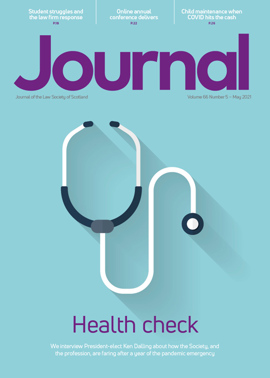COVID, lost income and child maintenance

Many people have experienced significant changes to their income and circumstances as a result of the COVID-19 pandemic. That in turn can impact the amount of maintenance separated parents are due to pay or receive. Most commonly we have seen reduced income due to furlough or unemployment, but some self-employed parents have also been forced to stop trading due to the lockdown rules. The question then is how that change impacts on the amount of child maintenance payable, if at all, and the recoverability of any arrears that may accumulate as a result.
At the point the pandemic hit us in March 2020, 56% of separated families with children had a child maintenance arrangement. That can take one of two forms.
The first is a statutory arrangement where the Child Maintenance Service (“CMS”) has made an assessment of the amount payable. The parents may then take responsibility for payment (“direct pay”), or CMS may manage the payments (“collect and pay”), but both are based on the CMS assessment. This accounted for 18% of families in 2019-20.
The second is a family based arrangement where they have agreed the amount without CMS input and payment is made directly between them. A further 38% of families had this type of arrangement.
The remaining 44% of separated families had no formal arrangement.
If there has been a change in the paying parents’ financial circumstances, the first step is always to ascertain whether they have a CMS arrangement or a family based arrangement. It’s common for parents to be confused by this, generally because they will often use the CMS calculator as the basis of the family based arrangement and so think of the child maintenance as being set by CMS. It is, however, a crucial differentiation when it comes to assessing the correct approach to any review.
Paying parents: CMS assessment
What is the basis of the CMS assessment?
For those with a CMS assessment, the starting point to working out whether a change can be sought is to look at the basis for the current assessment. When the Child Support Agency rebranded as CMS, one of the key changes was to move to a system whereby CMS obtains information about the paying parent’s income directly from HMRC. Where the paying parent is employed, this will be their PAYE information, and for self-employed parents HMRC will provide their most recent tax return.
In normal circumstances, there is an automatic annual review on the anniversary of the case starting. For the majority of people there will only be minor fluctuations in their income, usually related to an annual salary review, and the changes would be picked up and incorporated once a year. While the system isn’t perfect and there is an inherent lag in income changes working their way through to the maintenance payment, when balanced against the cost of more regular reviews and the simplicity of using HMRC-provided information, it has proven to work reasonably well.
However, anyone who has seen a major drop in income, has been made redundant or has seen their business fail or grind to a halt due to COVID could find themselves facing a situation where they can’t wait for the annual review date to roll round, or even if they could, an annual review wouldn’t immediately help them because the review will use the figures in the previous year’s (largely pre-COVID) tax return.
When can a paying parent apply for a review?
A paying parent’s remedy is to request a review on the basis that their current income has changed. In order to qualify they need to demonstrate their income has changed by 25% or more from the date of the last assessment. Employed people require to produce their most recent payslips to show their reduced income. Anyone who has been on furlough, and so likely to have been receiving 80% of their salary, will therefore not automatically qualify for a reduction in child maintenance payments unless they have also lost overtime or other payments.
For self-employed people the situation is more complicated. They will require to have their accounts for the year ending 5 April 2021 prepared now, which is significantly earlier than normal given the tax return isn’t due to be lodged until January 2022. Unless and until those accounts are prepared, CMS will work on the basis of the previous tax return, which probably won’t help. If the business has ceased trading, the situation is different, in that CMS should assess their income at nil.
Another option for employed and self-employed parents who have seen their income reduce is to make an application for benefits. The Government made changes that were intended to make it easier for self-employed people to make an application for universal credit, so this is worth exploring. The key upside in this context is that anyone in receipt of universal credit should automatically be moved to a child maintenance assessment of £7 per week flat rate.
What about arrears?
The date of intimation to CMS of a change in income is crucial. Even if a parent unquestionably sees a dramatic drop in income, that will not be taken into account until CMS is informed. CMS cannot normally backdate any change, and arrears will accrue until the change is intimated to it. It follows that any paying parent in this situation should ensure they inform CMS as soon as possible. CMS can be slow in processing
things and it may take a while to action, but when it does, it will use the date of intimation.
Paying parents: family based arrangements
How can a paying parent suggest a review?
For those with a family based arrangement the situation is different. If there is a minute of agreement regulating the payments, the terms of that contract will prevail, subject to the usual limitation that the parties can make an application to CMS after one year.
What about arrears?
Arrears will continue to accrue unless and until steps are taken to formally review the amount in the way set out in the contract, or a CMS application is made, albeit that application would be complicated by the fact that the starting point for the assessment would be the historic financial information held by HMRC.
Receiving parents
The key message for receiving parents is that if they are faced with a situation where the paying parent is intimating a drop in income and unilaterally reducing or stopping payments, or threatening to, having a formal child maintenance calculation in place is crucial. That’s because a parent’s liability to pay child maintenance through CMS only starts when the other parent’s application is intimated to CMS, which can create a problem for receiving parents whose arrangements are not regulated by contract or where no application has been made. As already noted, CMS will not backdate any assessment, therefore receiving parents whose informal payments have stopped or reduced should apply for an assessment sooner rather than later (incurring a one-off application fee of £20).
If they are on a direct pay arrangement and the paying parent has stopped paying, it is possible to request a change to collect and pay (a small fee applies). CMS can be reluctant to enforce arrears which have accumulated before the switch, as it can be difficult for it to know whether the maintenance was paid or not. Again, it’s better to act sooner rather than later.
If the paying parent makes an application to CMS for a review, the receiving parent will be notified of any decision to change the amount payable. They have 30 days from the date of the notification letter to object. If they object, CMS will review the decision, and if after that the receiving parent still isn’t happy they can appeal to the First-tier Tribunal.
Grounds for variation
In practice the CMS system relies on the receiving parent challenging decisions. If they don’t, CMS will generally accept the information provided by the paying parent at face value. In this scenario the receiving parent would apply for a variation themselves, using all the information they have to point CMS in the right direction. An example of this would be if the paying parent says they have ceased trading since COVID struck, but the receiving parent disputes that because they have seen local adverts from the business.
We may also see a self-employed paying parent stop paying themselves an income if takings are down, but keep paying their new partner in full. This could lead to a challenge on the ground of diversion of income. Unearned income also provides a ground for variation and allows CMS to take account of income from rental properties, investments and dividends. This may be seen more commonly in the current environment where more people are living off their assets.
Finally, a variation can be sought on the basis of earned income in circumstances where a person is paying the flat rate of £7 a week because they are in receipt of a welfare benefit, but are also receiving income from employment, self-employment or a pension.
Practice points for family lawyers
Clients should be advised that CMS relies heavily on information provided by HMRC. That can lead to inequitable assessments, particularly in the current climate. Short time limits apply to variations and appeals, so be sure to explore the issue as soon as you become instructed. While there may not always be grounds for a variation, they should be checked for in every case.






